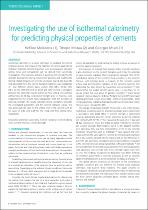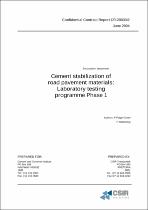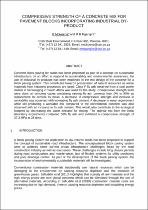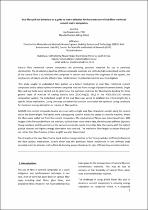 ResearchSpace
ResearchSpace
Investigating the use of isothermal calorimetry for predicting physical properties of cements
JavaScript is disabled for your browser. Some features of this site may not work without it.
- ResearchSpace
- →
- Research Publications/Outputs
- →
- Journal Articles
- →
- View Item
| dc.contributor.author |
Mokoena, Refiloe

|
|
| dc.contributor.author |
Motau, T

|
|
| dc.contributor.author |
Mturi, George AJ

|
|
| dc.date.accessioned | 2021-10-07T06:53:45Z | |
| dc.date.available | 2021-10-07T06:53:45Z | |
| dc.date.issued | 2021-09 | |
| dc.identifier.citation | Mokoena, R., Motau, T. & Mturi, G.A. 2021. Investigating the use of isothermal calorimetry for predicting physical properties of cements. <i>ConcreteBeton, 166.</i> http://hdl.handle.net/10204/12121 | en_ZA |
| dc.identifier.issn | 1682-6116 | |
| dc.identifier.issn | 2521-8263 | |
| dc.identifier.uri | http://hdl.handle.net/10204/12121 | |
| dc.description.abstract | Isothermal calorimetry is a useful technique for studying the cement hydration process that measures the heat flow of cement paste during hydration. Standard cement properties, such as compressive strength, setting times and compatibility can be derived from calorimetry investigation. This becomes relevant in assisting with monitoring the strength development during construction activities and studying the thermal related behaviour of concrete structures. During this study, the heat generated from the cement hydration reactions was investigated of four different cement types, namely CEM II/B-V 32.5N, CEM II/B-V 42.5N, CEM II/A-M (S-V) 42.5R and CEM I 52.5N. Correlations between the calorimeter results and the (i) initial setting time and final setting time; (ii) 28 day compressive strength and; (iii) fineness, were established for the cement types investigated. With the exception of early-day strength, the results indicated strong correlations between the investigated parameters and the cement hydration curves. This was particularly the case for the setting time of the cements with an R2 value of 0.82 and 0.89 for the initial and final setting times respectively. | en_US |
| dc.format | Fulltext | en_US |
| dc.language.iso | en | en_US |
| dc.relation.uri | https://cemcon-sa.org.za/issues/issue166/html5/index.html?page=1&noflash | en_US |
| dc.source | ConcreteBeton, 166 | en_US |
| dc.subject | Isothermal calorimetry | en_US |
| dc.subject | Cement hydration | en_US |
| dc.subject | Cement setting time | en_US |
| dc.subject | Cement fineness | en_US |
| dc.subject | Cement strength | en_US |
| dc.title | Investigating the use of isothermal calorimetry for predicting physical properties of cements | en_US |
| dc.type | Article | en_US |
| dc.description.pages | 8-14 | en_US |
| dc.description.note | Article was also presented as a paper at the Young Concrete Researchers, Engineers & Technologists Symposium (YCRETS), University of the Witwatersrand, Johannesburg, South Africa, 13-14 July 2021 | en_US |
| dc.description.cluster | Smart Mobility | en_US |
| dc.description.impactarea | Pavement Design and Construction | en_US |
| dc.description.impactarea | Advanced Materials Testing | en_US |
| dc.identifier.apacitation | Mokoena, R., Motau, T., & Mturi, G. A. (2021). Investigating the use of isothermal calorimetry for predicting physical properties of cements. <i>ConcreteBeton, 166</i>, http://hdl.handle.net/10204/12121 | en_ZA |
| dc.identifier.chicagocitation | Mokoena, Refiloe, T Motau, and George AJ Mturi "Investigating the use of isothermal calorimetry for predicting physical properties of cements." <i>ConcreteBeton, 166</i> (2021) http://hdl.handle.net/10204/12121 | en_ZA |
| dc.identifier.vancouvercitation | Mokoena R, Motau T, Mturi GA. Investigating the use of isothermal calorimetry for predicting physical properties of cements. ConcreteBeton, 166. 2021; http://hdl.handle.net/10204/12121. | en_ZA |
| dc.identifier.ris | TY - Article AU - Mokoena, Refiloe AU - Motau, T AU - Mturi, George AJ AB - Isothermal calorimetry is a useful technique for studying the cement hydration process that measures the heat flow of cement paste during hydration. Standard cement properties, such as compressive strength, setting times and compatibility can be derived from calorimetry investigation. This becomes relevant in assisting with monitoring the strength development during construction activities and studying the thermal related behaviour of concrete structures. During this study, the heat generated from the cement hydration reactions was investigated of four different cement types, namely CEM II/B-V 32.5N, CEM II/B-V 42.5N, CEM II/A-M (S-V) 42.5R and CEM I 52.5N. Correlations between the calorimeter results and the (i) initial setting time and final setting time; (ii) 28 day compressive strength and; (iii) fineness, were established for the cement types investigated. With the exception of early-day strength, the results indicated strong correlations between the investigated parameters and the cement hydration curves. This was particularly the case for the setting time of the cements with an R2 value of 0.82 and 0.89 for the initial and final setting times respectively. DA - 2021-09 DB - ResearchSpace DP - CSIR J1 - ConcreteBeton, 166 KW - Isothermal calorimetry KW - Cement hydration KW - Cement setting time KW - Cement fineness KW - Cement strength LK - https://researchspace.csir.co.za PY - 2021 SM - 1682-6116 SM - 2521-8263 T1 - Investigating the use of isothermal calorimetry for predicting physical properties of cements TI - Investigating the use of isothermal calorimetry for predicting physical properties of cements UR - http://hdl.handle.net/10204/12121 ER - | en_ZA |
| dc.identifier.worklist | 24989 | en_US |








